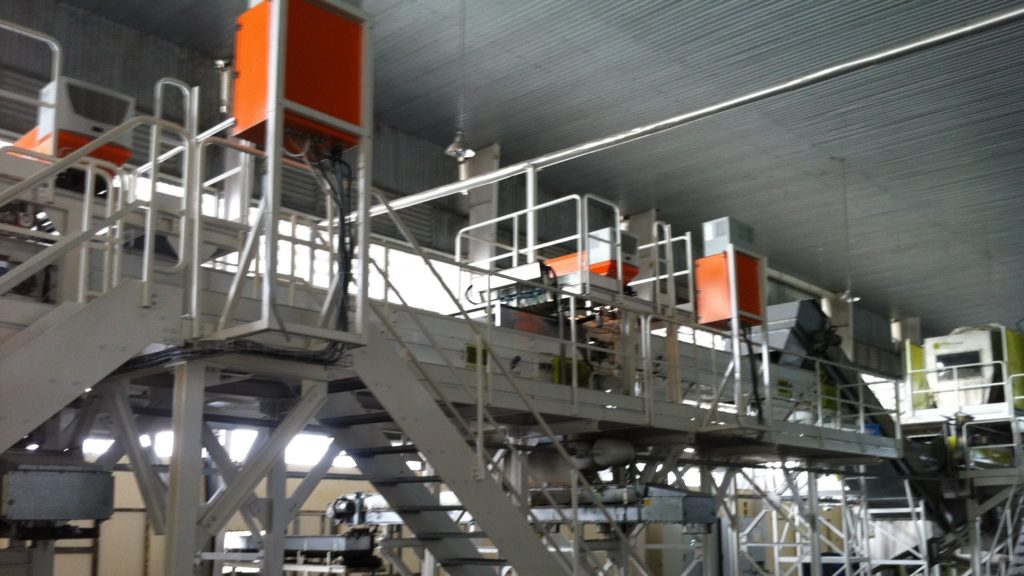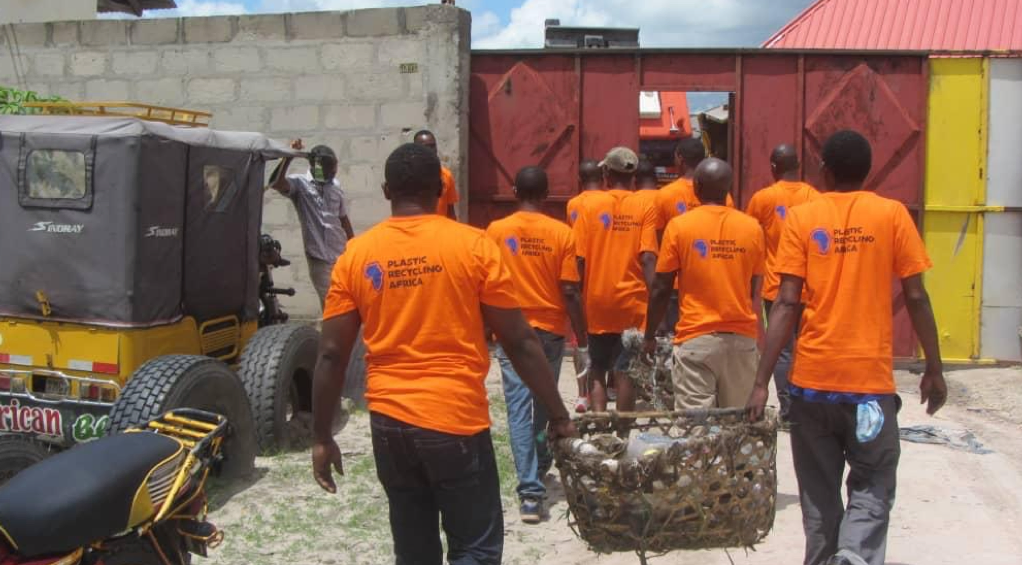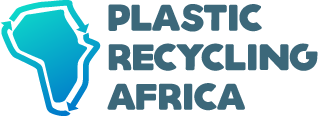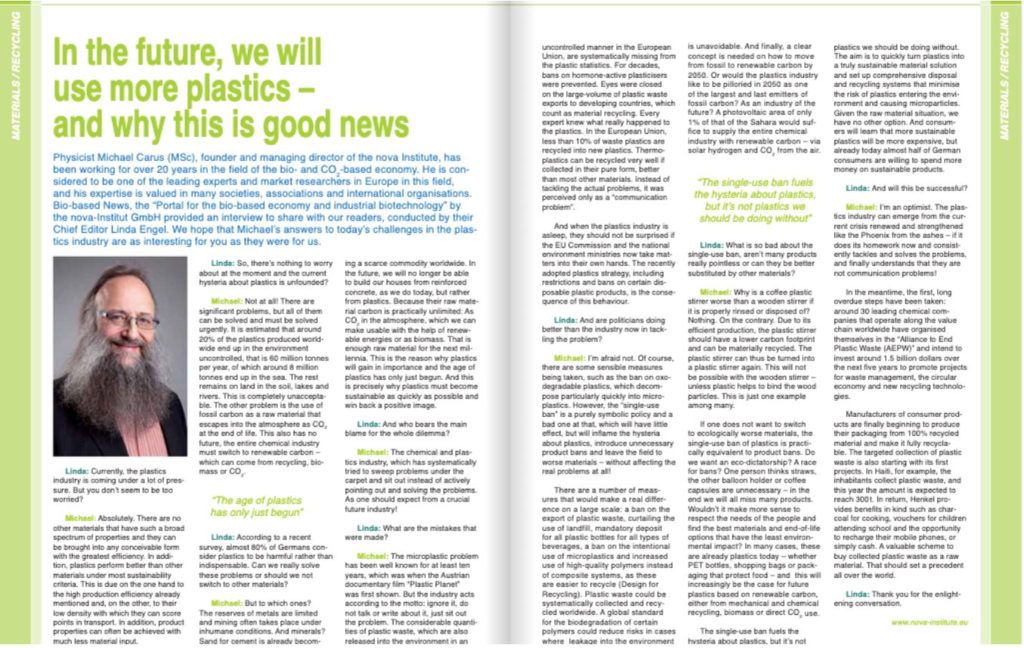
March 6th 2020 Launch of the European Plastics Pact
About the European Plastics Pact
Initially led by France, the Netherlands and Denmark, the European Plastic Pact is a public-private coalition that forms a European network of companies, states and other organisations such as NGOs on mastering single-use plastic products and packaging.
In the face of the proliferation of plastic waste, the aim of the pact is to set ambitious common objectives and to encourage cooperation, innovation and harmonisation at the European level, in order to bring about a truly circular European plastics economy.
The Pact relies on the “pioneers” in the plastics value chain and on the most committed governments, in order to create a bold movement that will pave the way for the rest of the market.
The Pact works on all levels to reduce the release of plastics into the environment: by improving the recyclability and reusability of products by design, by shifting to a more responsible use of plastics, by increasing collection, sorting and recycling, and by incorporating more recycled materials into new products and packaging.
Mastering the use of plastics in a circular economy
Plastics are everywhere in our daily lives, bringing many economic and environmental benefits. Plastics are strong, durable and versatile materials. They enhance comfort, safety and hygiene. Using plastics packaging can increase the shelf life of products and reduce fuel costs in transportation of goods, helping to cut carbon emissions. All this has resulted in a huge surge in plastics production. Over the past fifty years, the global use of plastics has increased twentyfold and is still growing.
At the same time, plastic waste is increasingly becoming a global problem, as reuse and recycling of plastics have not kept pace. This is because many products and packaging types are not designed for reuse or effective recycling. Not all use of plastics is necessary for product functionality. In addition, collection, sorting and recycling are still underdeveloped. This means a significant proportion of our plastic waste is still being incinerated or goes to landfill, which negatively affect carbon emissions. Another part ends up as litter in our environment, where it may harm wildlife or degrade into potentially harmful microplastics. While all this valuable material is being wasted, the proportion of fossil fuel being used to produce new plastics continues to grow (from 6% of oil production now to an estimated 20% by 2050).
The common vision
To tackle plastics waste and pollution at the source, we need to fundamentally rethink the way we produce, use and reuse plastics. No single organisation or individual can do this on its own. It requires a systemic shift, involving collective action by businesses from across the plastics value chain, governments, and civil society. A common vision aligns all actors on a joint understanding of what good looks like. It guides the search for solutions and aligns actions taken in the European Plastics Pact on a common sense of direction.
For plastics, the European Strategy for Plastics in a Circular Economy has set out a vision for a plastics circular economy in the EU. For plastic packaging, the New Plastics Economy Global Commitment, led by the Ellen MacArthur Foundation in collaboration with the UN Environment Programme, has united more than 400 organisations from across the global plastics packaging value chain behind a common vision of a circular economy for plastics. These include plastic packaging producers, consumer goods companies, retailers, companies involved in the collection, sorting and recycling of plastics, as well as national, regional and city governments, NGOs, financial institutions, industry associations, universities and other international organisations such as the World Economic Forum and the World Wide Fund for Nature (WWF). National plastics pacts, such as The French National Pact on Plastic Packaging, the Plastics Pact NL and the UK Plastics Pact have taken action towards the same common vision for a circular economy for plastics. The European Plastics Pact adopts this vision, as this provides a global framework for our actions.
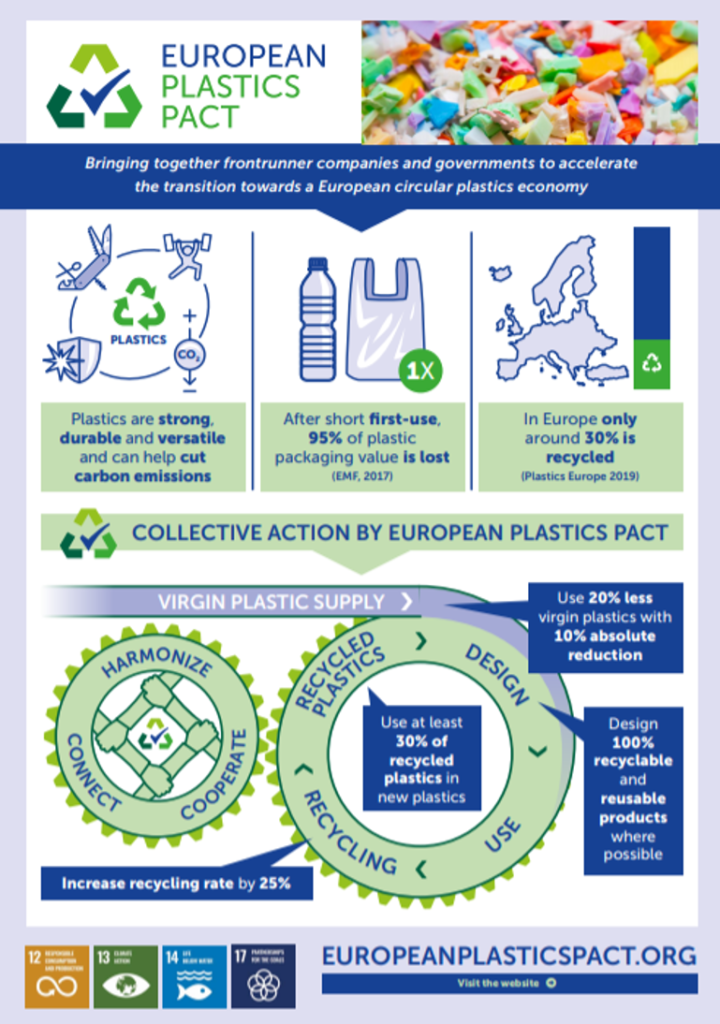
The Goals:
- Reusability and recyclability by design
- To design all plastic packaging and single-use plastic products brought to the market by participants to be reusable where possible, and in all cases to be recyclable by 2025.
- Responsible use of plastics
- To shift towards a more responsible use of plastic packaging and single-use plastic products, aiming for a reduction in virgin plastic products and packaging of at least 20% (by weight) by 2025, with half of this reduction coming from an absolute reduction of plastics.
- Collection, sorting and recycling
- To raise the collection, sorting and recycling capacity in the involved countries of all plastics used in packaging and single use products by at least 25 percentage points by 2025 and to reach a quality standard of the output of the collection, sorting, and recycling process that matches market demand for recycled plastics.
- Use of recycled plastics
- To boost recycled plastics use in new products and packaging as much as possible by 2025, with plastics-using company achieving an average of at least 30% recycled plastics (in weight) in their range of products and packaging.

